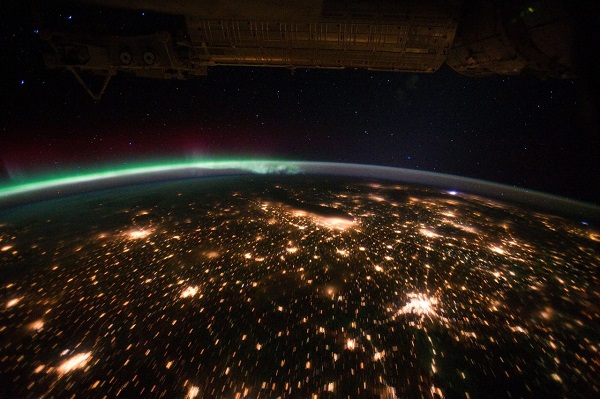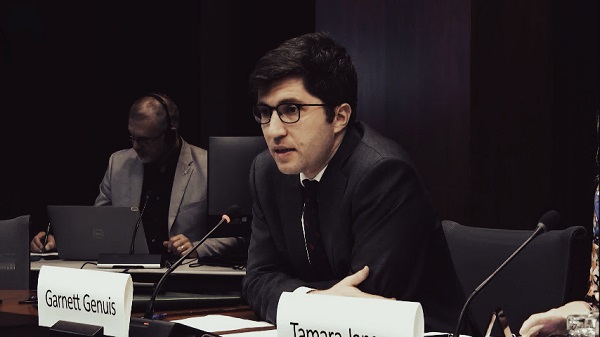Censorship Industrial Complex
2024 is Going to Give us All PTSD

From the Frontier Centre for Public Policy
By Terry Etam
And while there are crazies on either side of the spectrum, the difference is that right wing crazies are right wing crazies, and CBS News is CBS News.
The lazy days of summer serve a useful purpose. A few weeks away from everything clears the head, if one can escape the global cacophony. It works. Try it if you can; declutter the mind, step out of the fray. Upon returning, it seems possible to see the forest instead of the trees, to rejoin the info flow gradually from a disconnected, higher level.
Personally, it also helps to get disconnected from the energy world as well, and to travel to places far removed from the energy epicentre to take the pulse of people that have nothing to do with it.
Having said that, it can be a shock to realize how poorly energy is understood. It shouldn’t really be a shock, of course; it is a vast and complicated topic that almost no one understands in its entirety.
It’s not unreasonable though to ask that our leaders have a better grasp, but it is frightening to realize that they do not. We see senior policy makers and geopolitically-significant people/organizations/policy makers enacting suicidal energy policies (the examples are in the hundreds, but look at Germany’s decision to shut down much-needed nuclear power plants as the poster child).
The reason leaders are so eager to throw common sense out the window and embrace energy-ignorant policies is illuminated quite clearly when speaking with the average citizen about what everyone always talks about – the weather. Maybe it’s a Canadian thing but it’s a topic that can’t be avoided, and right there, right away, the wheels come off. Climate messaging has been so resoundingly successful that, in the public’s eye, any weather deviation whatsoever is proof of man-made climate change. The news cycle ramps this phenomenon up to a fever pitch. It’s so freaking draining; getting sidetracked in a weather conversation ruins my zen and I run away.
The attitude is so pervasive it is as though everyone has forgotten that heat waves/droughts/floods existed since time immemorial, and many ancient ones were far more severe than today’s events. But as we all know, once pop culture drills something into someone’s head long enough and loud enough, it becomes a truth (former Trudeau government bigwig Catherine McKenna, climate alarmist extraordinaire, was famously recorded explaining to an acquaintance in a bar how this works: “Just keep saying the same thing louder and louder and eventually they believe it.” (A not-dumb eastern Canadian lawyer explained to me that climate change was now so bad that the earth was actually heating up from the inside, which was her explanation for why the soil was dry some 6 feet down on her property. That kind of boldly asserted absurdity is not easily pounded into heads, but once it’s there, dynamite won’t get it out.)
It’s easy to point the finger at the general population and declare “they’re all stupid,” I hear that a lot, but it’s a bit unfair. They are energy ignorant, as are most, and when it come to alarmist messaging, well, when the government itself engages in scare tactics at the highest level, such as when federal leaders hint in their crazy way that extreme weather is something they can ultimately control through government policy, a lot of people kind of just sigh and accept it, they go with the flow.
The media machine, starved for attention, loves chaos and fear and flash. It encourages us to hate by zeroing in on the inflammatory. It encourages us to rage by taking positions, and draping itself in mock-innocence – “What? Us? Biased? Outrageous. We even have fact checkers!”
Yeah…about that… CBS News reports on the ‘no tax on tips’ idea. In June 2024, Trump proposed the idea of eliminating taxes payable on tip income. CBS news ran with the story on Twitter thusly: “Former President Donald Trump’s vow to stop taxing tips would cost the federal government up to $250 billion over 10 years, according to a nonpartisan watchdog group.”
In August 2024, two months later, Kamala Harris somehow came up with the exact same policy, and CBS News covered her theft thusly: “Vice President Kamala Harris is rolling out a new policy position, saying she’ll fight to end taxes on tips for service and hospitality workers.”
They don’t even care any more. There is no shame, or self-reflection, no hesitancy. It’s pure peacock feathers.
And while there are crazies on either side of the spectrum, the difference is that right wing crazies are right wing crazies, and CBS News is CBS News.
While it is a generational thing to think that times have never been more crazy, it is hard to put today’s weirdness into any sort of historical context. “The News” is a relatively recent phenomenon in the big scheme of things, hardly more than a century or two old, and thus it is a living object, morphing over time as communications capabilities change, and as we become more interconnected at light speed. Fifty years ago we either waited for a daily or weekly newspaper to find out what was happening in the world, or tuned in to a nightly television program that chose the stories for us and read them aloud in some soothing voice.
We were told what the news was to the extent the news organizations could unearth or cover it, in a time when the ability to cover bigger events on the other side of the world was almost nonexistent. Crack reporters did great work speaking to people who either witnessed or participated in events, and politics covered what was known about what politicians were up to, and not much may have been known at all. In fact those politicians were acting in huge information vacuums as well.
Today, it’s wide open. We see everything. At least we do in the west, not so much in totalitarian states, but even there we can observe a lot. We have eyes on everything including live flight trackers doing their thing every minute of the day on social media, we can see a graphic of every trip Taylor Swift’s jets made over then course of a year (yes, she has two, apparently, another bit of trivia I have no justification or enthusiasm for knowing).
We also see an infinite assessment of government policy, how it comes to be, how it’s enacted, how it’s enforced, how it is playing out, like we never have before in history. The feedback loops are constant and detailed, and while the information is sometimes distorted for ideological purposes, the preponderance of analysis does tend to zero in on what is actually happening, shorn of much of the spin.
We can see the genesis of much of today’s craziness. One gets the feeling, from a high-enough thought plane, that some well-educated and well-funded people decided to make some very big tectonic moves that would put the world on a better path. Being God’s gift to central planning, this global who’s who fully embraced radical – and I do mean radical – change as a prerequisite for human survival. (The IPCC for example said that, to achieve climate targets, there would need to be an unprecedented rewiring and rebuilding of pretty much the entire world, quickly. They offered no advice, just “do it or you all perish” and that was enough for the WEF crowd to pool their billions and buy the best politicians they could.)
Our western leaders, full of oats, delusions of grandeur, and a blank checkbook/chequebook – because they don’t understand the cold hard realities of how to run a successful economic enterprise – went for broke, looking to go down in history as visionaries that bent the trajectory of modern life as we know it. They burned bridges – no going back, no second guessing (any second-guessing is now deemed ‘misinformation’ or ‘disinformation’).
What we see all around us is the detritus of their failure, on so many levels, and we don’t really know what to do about it. We’ve been conditioned to accept that the ‘experts’ know what they are doing, and that capable hands will guide us through whatever fate throws at us. We turn to the simplistic world of pop culture for explanations because the stone cold reality of things is just too hard to wrap our heads around, and we don’t want to spend our days trying to figure it all out.
We are still people, and it is dumb to expect a solid grounding of complex topics that the media distorts mercilessly to pander to the fear.
And yes there are of course flat out fools, across the political spectrum and beyond. Feel free to discount them entirely. Luckily, let’s be honest, no matter our political persuasion, they’re generally not hard to spot, which is why attempting to limit free speech is such a fool’s game.
On the other hand, it appears the world’s attention is going to be dominated by the upcoming US election, and it is going to be so freaking far out and insane that it will be hard to reach December without PTSD.
Some words to keep in mind when things become so crazy it seems like it isn’t real (if you think that’s hyperbole, consider that Russia’s war against Ukraine, a bonafide war with tanks and bombs and death and endless heartache, often sadly doesn’t even make the front page, pushed aside by madness in the US, UK, Middle East, Africa…).
We are in a period of turmoil where people don’t know where to turn. Most have been led to believe that they are fundamentally bad, either through their consumption choices or their preference for “what was good before” or if their belief system doesn’t line up exactly with the mainstream narrative.
As a wise friend recently pointed out, in times of trouble people seek out “messiahs”, they look for a jolt from an outsider, because the “inside”, the swamp, has let them down and left them disoriented. Remember that Trump is a symptom, not a cause. Many, many people, perhaps a majority, are willing to overlook his bombastic antics because he represents a hope that can only come from the outside. As proof of this notion, consider this quote from an astonishing source – John Lydon of the band Public Image Ltd., formerly Johnny Rotten of the Sex Pistols, the ultimate punk of all punks, speaking of Trump: “He’s a thoroughly unpleasant fellow, no doubt about it. But he’s not a politician and I hate politicians! Screw the lot of ‘em. I’d rather have a maniac…a real estate land shark. There will be no world carrying on as long as we keep enforcing dogmas.”
No matter what happens over the next year or two, we will find a new equilibrium just as the world did post WWII. What it will look like is a good question, but there will be some sort of stability.
Probably. What the hell do I know. Good luck.
Rest assured that the future of energy providers is as strong as it ever has been, no matter what you hear on the airwaves. Energy will be the last industry standing, no matter what happens.
Terry Etam is a columnist with the BOE Report, a leading energy industry newsletter based in Calgary. He is the author of The End of Fossil Fuel Insanity. You can watch his Policy on the Frontier session from May 5, 2022 here.
Censorship Industrial Complex
Canada’s justice minister confirms ‘hate crimes’ bill applies to online content

From LifeSiteNews
Individuals could be criminally charged for social media posts or other online content deemed offensive by the government under the Combating Hate Act.
Canadian Justice Minister Sean Fraser admitted that his new “hate crime” bill would indeed allow a person to be criminally charged for social media posts deemed offensive by the government.
Recently asked about Bill C-9, the Combating Hate Act, Fraser said the bill would indeed apply to certain online content that involves the “willful promotion of hatred.”
“Generally speaking, the law will apply equally online as it does in real communities,” he said, adding, “just in the limited circumstances where there is the willful promotion of hatred against someone.”
As reported by LifeSiteNews, Bill C-9 has been blasted by constitutional experts as allowing empowered police and the government to go after those it deems have violated a person’s “feelings” in a “hateful” way.
Bill C-9 was brought forth in the House of Commons on September 19 by Fraser. The Liberals have boasted that the bill will make it a crime for people to block the entrance to, or intimidate people from attending, a church or other place of worship, a school, or a community center. The bill would also make it a crime to promote so-called hate symbols and would, in effect, ban the display of certain symbols such as the Nazi flag.
While being questioned by Conservative MP Andrew Lawton about Bill C-9, Fraser was asked if the new law would “affect what people can say and write on the internet” and also if people could be retroactively punished for online comments made today.
In reply, Fraser said, “The only circumstance where you could imagine some online comment attracting scrutiny under this law would attach to behaviour that is criminal today but would be punished less severely.”
He said that “(t)he willful promotion of hate is a crime today, but we want to recognize a distinct charge where that same behaviour uses certain symbols of hate to bring a higher degree of culpability.”
John Carpay of the Justice Centre for Constitutional Freedoms (JCCF) has blasted Bill C-9 as something that would “empower police” and the government to go after those it deems have violated a person’s “feelings” in a “hateful” way.
Also, as reported by LifeSiteNews, Conservative MP Leslyn Lewis called out the hypocrisy of Bill C-9 for being silent regarding rising “Christian hate.”
Lewis has warned before that Bill C-9 will open the door for authorities to prosecute Canadians’ speech deemed “hateful possibly.”
Carpay also lamented how the bill mentions “rising antisemitism” but says nothing about the arson attacks on Catholic and Christian churches plaguing Canada.
“Anti-Catholic hate is obviously not on the minister’s radar. If it were, he would have mentioned it when introducing the Combating Hate Act,” Carpay wrote.
Since taking power in 2015, the Liberal government has introduced numerous new bills that, in effect, censor internet content and restrict people’s ability to express their views.
Censorship Industrial Complex
Who tries to silence free speech? Apparently who ever is in power.

Now that Trump is running Washington, Conservative thinkers must ponder a new-found appreciation for silencing speech they don’t like.
From StosselTV
War on Words: Both Parties Try to Silence Speech They Don’t Like
Donald Trump, before he was reelected, said he’d end government censorship. But now that he’s in office? He calls speech he doesn’t like “illegal.”
Free Speech should be a bedrock American value, no matter who’s in office. After the murder of Charlie Kirk, Republicans, who once complained about censorship, became censors. Democrats suddenly flip-flopped. All politicians should remember, the way to fight speech you don’t like, is with more speech, not censorship.
After 40+ years of reporting, I now understand the importance of limited government and personal freedom.
——————————————
Libertarian journalist John Stossel created Stossel TV to explain liberty and free markets to young people.
Prior to Stossel TV he hosted a show on Fox Business and co-anchored ABC’s primetime newsmagazine show, 20/20.
Stossel’s economic programs have been adapted into teaching kits by a non-profit organization, “Stossel in the Classroom.” High school teachers in American public schools now use the videos to help educate their students on economics and economic freedom. They are seen by more than 12 million students every year.
———
To make sure you receive the weekly video from Stossel TV, sign up here: https://www.johnstossel.com/#subscrib…
———
-

 Business1 day ago
Business1 day ago$15B and No Guarantees? Stellantis Deal explained by former Conservative Shadow Minister of Innovation, Science and Technology
-

 Health20 hours ago
Health20 hours agoFor Anyone Planning on Getting or Mandating Others to Get an Influenza Vaccine (Flu Shot)
-

 Alberta1 day ago
Alberta1 day agoPremier Smith moves to protect Alberta in International Agreements
-

 Business21 hours ago
Business21 hours agoLiberals backtrack on bill banning large cash gifts, allowing police to search Canadians’ mail
-

 Agriculture1 day ago
Agriculture1 day agoFrom Underdog to Top Broodmare
-

 Sports20 hours ago
Sports20 hours ago‘We Follow The Money’: Kash Patel Says Alleged NBA Ties To Mafia Just ‘The Start’ Of FBI Investigation
-

 Alberta2 days ago
Alberta2 days agoAlberta’s licence plate vote is down to four
-

 Bruce Dowbiggin2 days ago
Bruce Dowbiggin2 days agoIs The Latest Tiger Woods’ Injury Also A Death Knell For PGA Champions Golf?




